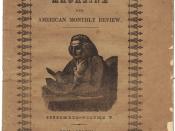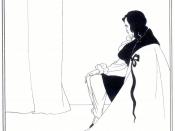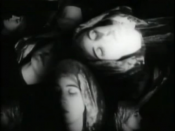Fear, terror and suspense are the most vivid emotions created by Poe's stories and by Hitchcock's films. Several themes are common to both: the madness that exists in the world, the paranoia caused by isolation which guides people's actions, the conflict between appearance and reality along with the double aspect of the human nature, and the power of the dead over the living. Not only the themes are similar in both men's work but also the details through which a story is written or shown. The similar themes and narrative techniques can be seen clearly in 'The Fall of the House of Usher' and in Psycho.
For both Poe and Hitchcock, madness exists in the world. 'The Fall of the House of Usher' and Psycho are two very similar studies in madness. Roderick Usher and Norman Bates are both insane. They have many common traits although they are also quite different.
They are victims of their fears and their obsessions. Norman who seems agreeable and shy is, in reality, a homicidal maniac who has committed matricide. He suffers from schizophrenia -- he acts as both himself and his dead mother. Roderick Usher appears strange from the beginning, almost ghost-like, with his 'cadaverousness of complexion' -- however, he is not a murderer. He suffers from a mental disorder which makes him obsessed with fear: fear of the past, of the house, of the dead. He finally dies, 'victim to the terrors he had anticipated.'
The way in which madness is projected in both stories is quite similar as well. The short story and the movie both take place in a dark and gloomy house, a 'ghostly house' -- 'a mansion of doom,' writes Poe. In both houses there is the presence of a mysterious woman. For Poe,



Wow
Awesome paper, was very interesting and I feel like asking you for more lol.
0 out of 0 people found this comment useful.